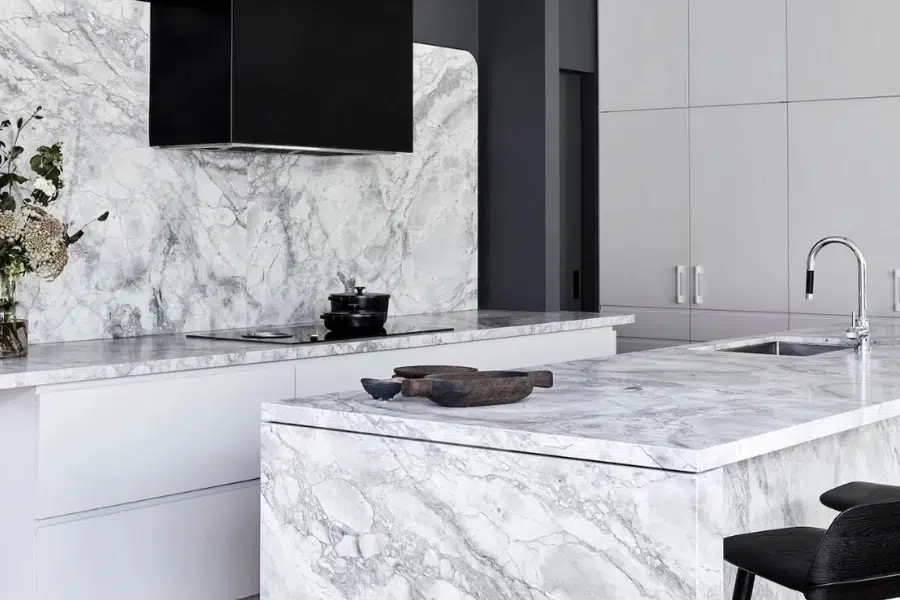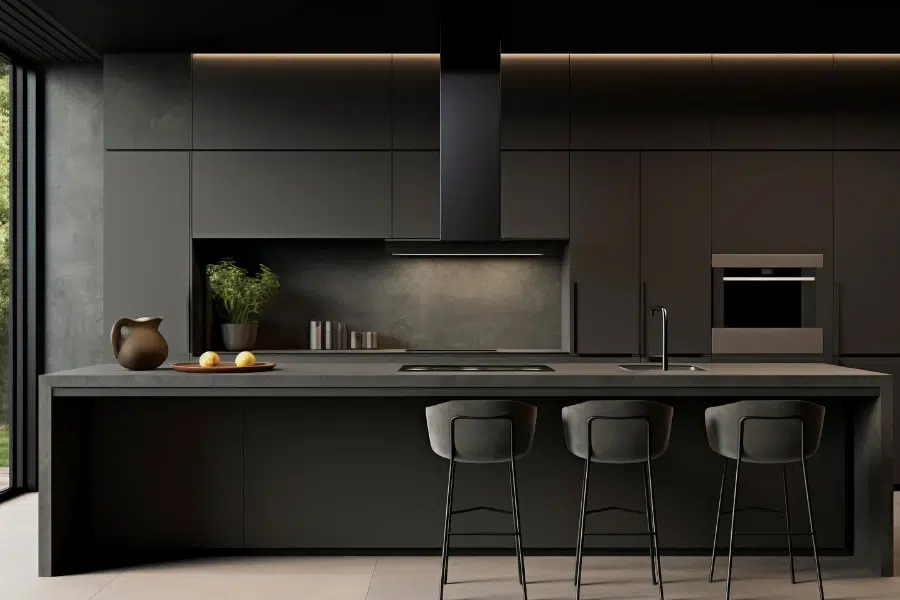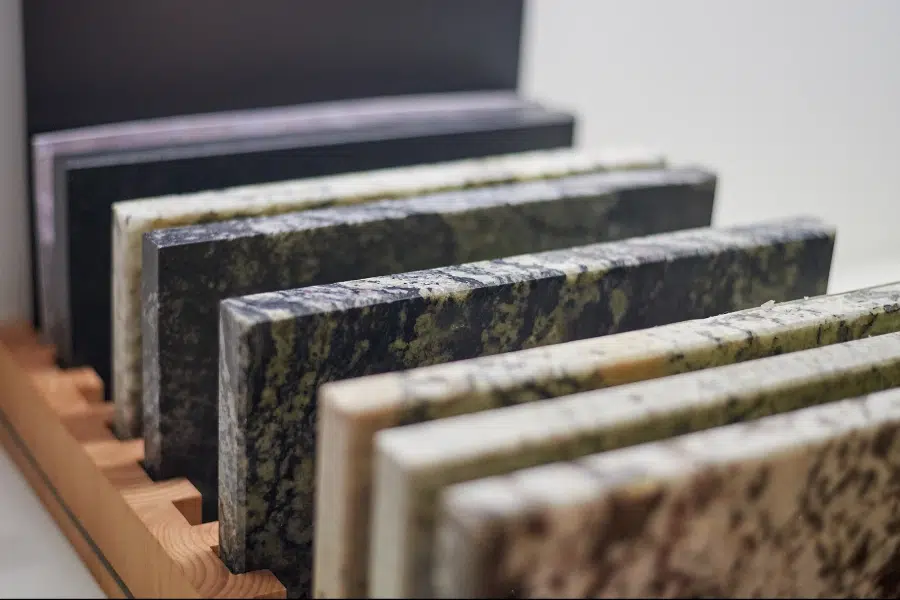The Pros and Cons of Porcelain Benchtops | Avant Stone
In today’s modern kitchen designs, the choice of benchtop material plays a pivotal role. Among the plethora of options available, porcelain benchtops have gained significant popularity. Known for their sleek finish and robust performance, they are often considered a top choice for many homeowners. However, like any material, porcelain benchtops come with their own set of advantages and disadvantages. This comprehensive guide aims to explore the pros and cons of porcelain benchtops, aiding you in making an informed decision for your kitchen.
Our Porcelain Slabs For Benchtops
-
Estremoz Porcelain
Estremoz PorcelainEstremoz Porcelain showcases a creamy neutral palette with graceful gold veining, offering a harmonious balance of elegance and subtlety. The delicate interplay of tones adds depth and character, making it a versatile choice for both residential and commercial interiors. Its timeless appeal elevates spaces with a refined, luxurious touch.
-
Dover White Porcelain
Dover White PorcelainInspired by Bianco Orobico Marble, White Dover White Porcelain showcases a delicate interplay of grey swirls and veining set against an ivory white background. The intricate patterns and soft tonal contrasts evoke a sense of natural luxury, while its durable porcelain composition ensures it’s ideal for contemporary and classic interiors alike. Durable and versatile, it’s ideal for residential and commercial spaces.
-
Desert Silver Porcelain
Desert Silver PorcelainDesert Silver Porcelain evokes understated elegance with its soft cream base and delicate brown veining. Inspired by the tranquil hues of desert landscapes, this porcelain slab adds warmth and subtle sophistication to any interior space. Its refined texture and neutral palette make it an excellent choice for creating serene yet stylish settings, ideal for flooring, walls, and countertops.
-
Aurelia Porcelain
Aurelia PorcelainAurelia Porcelain captivates with its white ivory base, intricately detailed by bold, angular veining in rich gold and soft grey. The striking veins cut through the surface with precision, creating a dynamic yet balanced pattern reminiscent of fine marble. Its intricate detailing makes it a versatile option for creating luxurious spaces in both residential and commercial projects.
-
Arabescato Rosalia Porcelain
Arabescato Rosalia PorcelainArabescato Rosalia Porcelain captivates with its striking interplay of colours and textures; blending a white base with brecciated veins in rich red and burgundy tones, accented by delicate touches of grey and green. Durable and versatile, Arabescato Rosalia is ideal for residential and commercial spaces.
-
Amalfi White Porcelain
Amalfi White PorcelainAmalfi White Porcelain showcases a luminous white surface accentuated by bold, flowing grey veining. Its refined yet statement-making design makes it a versatile choice for creating luxurious interiors, whether in a sleek modern kitchen or a classic bathroom retreat. Durable and low-maintenance, Amalfi White offers an ideal balance of aesthetics and functionality.
-
Zena Porcelain
Zena PorcelainSimple yet elegant. Zena porcelain features soft, warm tones on a beige canvas, adorned with delicate veins of gold and cream. Inspired by our Taj Mahal quartzite, Zena’s design seamlessly complements both contemporary and classic interiors, making it a versatile choice for any residential or commercial project. Experience timeless elegance with the refined beauty of Zena Porcelain.
-
White Fantasy Porcelain
White Fantasy PorcelainInspired by the timeless elegance of Super White Dolomite, White Fantasy captures the cool, arctic grey tones and distinctive grey veining that make Super White Dolomite so beloved. Durable and versatile, White Fantasy is ideal for both commercial and residential applications.
Our Porcelain Slabs For Benchtops
-
Estremoz Porcelain
Estremoz PorcelainEstremoz Porcelain showcases a creamy neutral palette with graceful gold veining, offering a harmonious balance of elegance and subtlety. The delicate interplay of tones adds depth and character, making it a versatile choice for both residential and commercial interiors. Its timeless appeal elevates spaces with a refined, luxurious touch.
-
Dover White Porcelain
Dover White PorcelainInspired by Bianco Orobico Marble, White Dover White Porcelain showcases a delicate interplay of grey swirls and veining set against an ivory white background. The intricate patterns and soft tonal contrasts evoke a sense of natural luxury, while its durable porcelain composition ensures it’s ideal for contemporary and classic interiors alike. Durable and versatile, it’s ideal for residential and commercial spaces.
-
Desert Silver Porcelain
Desert Silver PorcelainDesert Silver Porcelain evokes understated elegance with its soft cream base and delicate brown veining. Inspired by the tranquil hues of desert landscapes, this porcelain slab adds warmth and subtle sophistication to any interior space. Its refined texture and neutral palette make it an excellent choice for creating serene yet stylish settings, ideal for flooring, walls, and countertops.
-
Aurelia Porcelain
Aurelia PorcelainAurelia Porcelain captivates with its white ivory base, intricately detailed by bold, angular veining in rich gold and soft grey. The striking veins cut through the surface with precision, creating a dynamic yet balanced pattern reminiscent of fine marble. Its intricate detailing makes it a versatile option for creating luxurious spaces in both residential and commercial projects.
-
Arabescato Rosalia Porcelain
Arabescato Rosalia PorcelainArabescato Rosalia Porcelain captivates with its striking interplay of colours and textures; blending a white base with brecciated veins in rich red and burgundy tones, accented by delicate touches of grey and green. Durable and versatile, Arabescato Rosalia is ideal for residential and commercial spaces.
-
Amalfi White Porcelain
Amalfi White PorcelainAmalfi White Porcelain showcases a luminous white surface accentuated by bold, flowing grey veining. Its refined yet statement-making design makes it a versatile choice for creating luxurious interiors, whether in a sleek modern kitchen or a classic bathroom retreat. Durable and low-maintenance, Amalfi White offers an ideal balance of aesthetics and functionality.
-
Zena Porcelain
Zena PorcelainSimple yet elegant. Zena porcelain features soft, warm tones on a beige canvas, adorned with delicate veins of gold and cream. Inspired by our Taj Mahal quartzite, Zena’s design seamlessly complements both contemporary and classic interiors, making it a versatile choice for any residential or commercial project. Experience timeless elegance with the refined beauty of Zena Porcelain.
-
White Fantasy Porcelain
White Fantasy PorcelainInspired by the timeless elegance of Super White Dolomite, White Fantasy captures the cool, arctic grey tones and distinctive grey veining that make Super White Dolomite so beloved. Durable and versatile, White Fantasy is ideal for both commercial and residential applications.
Our porcelain Slabs For Benchtops
-
Verde Olympus Marble
Verde Olympus MarbleVerde Olympus features a deep intense dark green background, intersected by horizontal, diagonal and dramatic vertical veining. This Grecian beauty is perfect for those seeking a deep dark green colour with heavily contrasted angular veins .
-
Verde Oceania Marble
Verde Oceania MarbleVerde Oceania Marble captivates with a palette of green and grey hues set against an off-white backdrop, adorned with linear dark veining. Its crystalline structure allows light to glimmer upon its surface. This distinctive statement piece effortlessly brings the essence of natural elements into any design.
-
New York Marble
New York MarbleNew York Marble a name bestowed to this beautiful marble for its heavy movement and striking visuals. Characterized by its sharp dark purple veining against the white background with hues of pink and purple tones. New York Marble Slabs are for those looking to really make a statement, a fact aided by the translucence of this stone which makes it perfect for Backlighting. New York Marble transforms into a magical vista when backlit, making it ideal for feature walls, kitchens, and commercial applications alike.
-
Lloret Marble
Lloret MarbleLloret Marble is a symphony of charcoal, grey and white tones with heavy movement but a uniform structure. This wonderfully versatile marble is appealing both in residential setting but also in commercial setting due to its sophisticated yet appealing appearance. Due to its continuous movement of veins throughout this stone it can be used in myriad of different applications.
Our porcelain Slabs For Benchtops
-
Verde Olympus Marble
Verde Olympus MarbleVerde Olympus features a deep intense dark green background, intersected by horizontal, diagonal and dramatic vertical veining. This Grecian beauty is perfect for those seeking a deep dark green colour with heavily contrasted angular veins .
-
Verde Oceania Marble
Verde Oceania MarbleVerde Oceania Marble captivates with a palette of green and grey hues set against an off-white backdrop, adorned with linear dark veining. Its crystalline structure allows light to glimmer upon its surface. This distinctive statement piece effortlessly brings the essence of natural elements into any design.
-
New York Marble
New York MarbleNew York Marble a name bestowed to this beautiful marble for its heavy movement and striking visuals. Characterized by its sharp dark purple veining against the white background with hues of pink and purple tones. New York Marble Slabs are for those looking to really make a statement, a fact aided by the translucence of this stone which makes it perfect for Backlighting. New York Marble transforms into a magical vista when backlit, making it ideal for feature walls, kitchens, and commercial applications alike.
-
Lloret Marble
Lloret MarbleLloret Marble is a symphony of charcoal, grey and white tones with heavy movement but a uniform structure. This wonderfully versatile marble is appealing both in residential setting but also in commercial setting due to its sophisticated yet appealing appearance. Due to its continuous movement of veins throughout this stone it can be used in myriad of different applications.
Factors to Consider Before Selecting Porcelain Benchtops
- Assessing Your Design Aesthetic: Porcelain benchtops are renowned for their vast range of styles and finishes. They offer the unique ability to replicate the appearance of natural stones like marble or granite. This feature allows homeowners to achieve a high-end look without the associated costs and maintenance of natural stone.
- Understanding Durability Requirements: One of the key strengths of porcelain is its durability. It resists scratching, chipping, and heat, making it an ideal choice for kitchens that see a lot of action. However, understanding how this durability aligns with your kitchen’s daily use is crucial.
- Maintenance and Care: Porcelain’s low maintenance requirements are a significant draw for busy homeowners. Unlike natural stone, it doesn’t require regular sealing. Routine cleaning with non-abrasive cleaners is typically enough to maintain its pristine condition.
- EBudgetary Considerations: While porcelain offers numerous benefits, it can be a more expensive option compared to other materials. It’s important to balance your budget with your expectations for quality and longevity.
- Installation Expertise: The installation process for porcelain benchtops is crucial. It requires precision and skill, often necessitating the expertise of a professional. Incorrect installation can lead to issues such as cracking or chipping.

Find the Perfect Stone for
Your Project
Pros of Porcelain Benchtops
Exceptional Durability
Ease of Maintenance
Aesthetic Flexibility
Hygienic Surface
UV Resistance
Cons of Porcelain Benchtops
Higher Cost
Complex Installation
Porcelain slabs require careful handling and precise installation. This process often necessitates experienced professionals, potentially increasing overall costs.
Repair Challenges
Limited Edge Profiles
Cold Touch
Conclusion
Related Posts
Natural Stone Slab Supplier
Avant Stone brings together 20 years of stone industry experience to provide you with a range of globally sourced stone slabs including Marble slabs, Granite slabs and Quartzite Slabs.
We aim provide you quality service and distinctive stone products for your home or your commercial space. Avant Stone is the premier Stone Supplier of Granite, Quartzite and Marble slabs in Sydney.
Our showroom is located centrally in Greenacre, a mere 20 minutes from Sydney & Parramatta CBD.
Give us a call: 0298170037
Email us at: info@avantstone.com.au



























